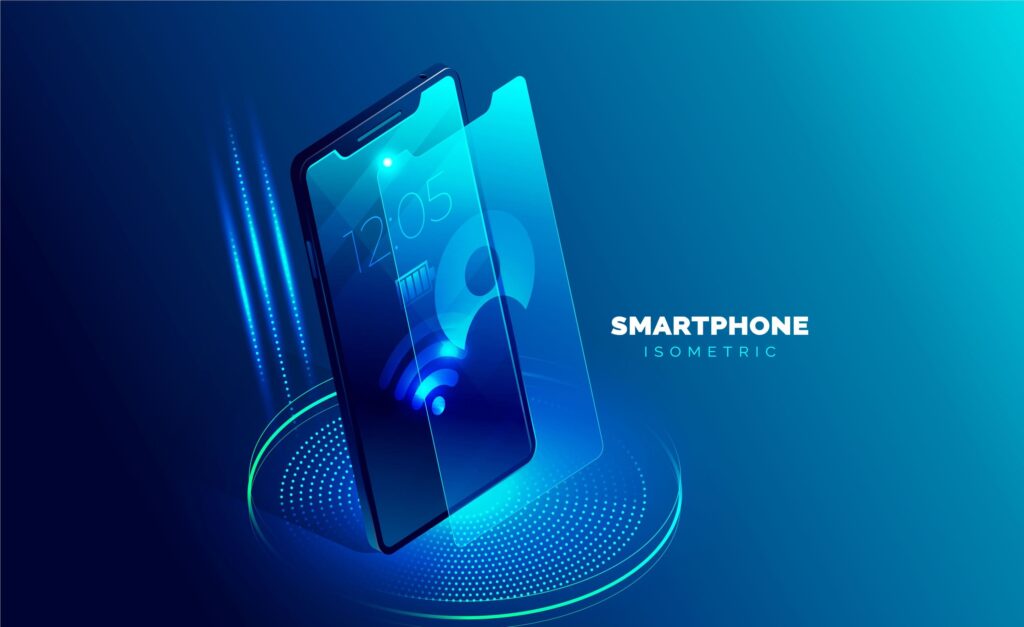Introduction
Mobile technology has altered how we communicate, work, and live. From simple voice calls to instant messaging apps, video conferencing, and social media platforms, mobile devices have revolutionized global communication. Today, they are not just tools but essential lifelines for both personal and professional interaction.
The rapid growth of mobile technology has also brought significant social and economic changes worldwide. Smartphones, equipped with advanced features, have become an extension of ourselves, offering everything from navigation tools and digital wallets to health monitoring apps and virtual assistants. This seamless integration of technology into our daily lives has blurred the lines between physical and virtual communication, enabling instant access to information, collaboration, and entertainment. Whether it’s a student attending an online lecture, a doctor consulting a patient remotely, or a family staying connected across continents, mobile devices serve as a bridge to overcome geographical and temporal barriers.
Furthermore, mobile technology has played a vital role in democratizing access to communication tools. In remote and underdeveloped regions, mobile phones have become essential for education, financial transactions, and healthcare services. With mobile internet penetration increasing globally, billions of people are now able to participate in the digital economy and access opportunities that were previously out of reach.
However, the rise of mobile technology also comes with its own set of challenges, including data privacy concerns, digital addiction, and the widening gap between those with and without access to advanced mobile technologies. Addressing these issues will be crucial as we continue to depend more heavily on mobile devices.
In this article, we’ll explore how mobile technology has reshaped communication, the key advancements, and what the future holds for this game-changing innovation.

1. The Evolution of Mobile Technology
1.1 From Basic Phones to Smartphones
The journey began with basic mobile phones that could only make calls and send texts. Smartphones eventually emerged, offering cameras, internet connectivity, and complex software. These early mobile phones were bulky, had limited battery life, and were primarily seen as luxury items. However, with technological advancements, phones became smaller, more efficient, and widely accessible. Smartphones revolutionized communication by combining multiple tools into a single device, including cameras, GPS, and web browsers. Today, they serve as multi-functional gadgets, enabling people to handle work, entertainment, and personal tasks seamlessly.
1.2 The Rise of Mobile Internet
Mobile internet has enabled access to information, entertainment, and social interaction anytime, anywhere. The introduction of 3G and 4G networks played a crucial role in enhancing mobile internet speed and reliability. This advancement made video streaming, online gaming, and remote work possible on mobile devices. The upcoming 5G technology promises even faster speeds and lower latency, which will further revolutionize mobile connectivity. Mobile internet has not only improved communication but also provided essential services such as mobile banking, telemedicine, and virtual education.
1.3 Mobile Apps: Transforming Everyday Communication
Apps like WhatsApp, Facebook Messenger, and Zoom have redefined how we connect across distances. These platforms allow instant messaging, voice calls, and video conferencing, breaking barriers of time and space. Beyond communication, mobile apps have transformed industries such as retail, healthcare, and transportation. Services like food delivery, ride-sharing apps, and e-commerce platforms have become integral to daily life. The app ecosystem continues to grow, offering solutions for productivity, health, entertainment, and more. As mobile apps become smarter with AI integration, their role in enhancing communication and simplifying complex tasks will only expand further.
2. Mobile Technology and Global Communication
2.1 Breaking Geographical Barriers
Mobile technology allows instant communication across the globe without physical limitations. With mobile devices, people can connect with friends, family, and colleagues from different parts of the world in real time. This capability has been particularly impactful in remote regions, where traditional communication infrastructure is often lacking. Mobile technology bridges the digital divide by offering reliable and affordable communication solutions, enabling people to participate in global conversations and collaborations. Businesses have also greatly benefited from this advancement, as they can now expand their operations and connect with international clients and partners seamlessly.
2.2 Real-Time Connectivity
Real-time messaging and video calls have made communication easier and faster. Platforms such as Zoom, Microsoft Teams, and WhatsApp have become essential tools for both personal and professional interactions. In the workplace, remote teams can collaborate efficiently, share ideas, and make decisions without the need for physical meetings. On a personal level, families separated by long distances can maintain strong relationships through daily video chats and instant messaging. Real-time connectivity has also revolutionized global events, enabling people to attend virtual conferences, webinars, and live broadcasts from anywhere in the world. As mobile networks continue to improve, real-time communication will become even more immersive and reliable, breaking down barriers and connecting people across continents.
3. The Role of Social Media in Communication
3.1 Social Media Platforms
Social media apps, like Instagram, Facebook, and Twitter, enable mass communication and real-time updates. These platforms allow users to share photos, videos, and updates with a global audience instantly. They have become powerful tools for activism, raising awareness about social issues, and organizing movements. Additionally, businesses leverage social media to promote their products, interact with customers, and build brand loyalty.
3.2 Influence on Personal Relationships
Social media bridges gaps between families and friends, no matter the distance. It allows people to stay connected through messaging, video calls, and shared digital experiences. However, it also comes with challenges, such as the risk of superficial connections and the impact on mental health from excessive usage. Nonetheless, when used mindfully, social media can significantly enhance personal relationships and keep people emotionally connected despite physical distances.
4. Mobile Communication in Business
4.1 Remote Work and Collaboration
Mobile technology has enabled businesses to operate remotely, enhancing productivity and fostering efficient team collaboration.
4.2 Customer Engagement
Businesses leverage mobile apps for direct interaction and personalized customer experiences, improving satisfaction and building long-term brand loyalty.
Let me know if you need further refinements!
5. Mobile Technology and Education
5.1 E-Learning Platforms
Mobile apps like Coursera and Khan Academy provide educational opportunities worldwide, making quality education accessible to learners regardless of their location.
5.2 Access to Information
Students can access global knowledge resources anytime via mobile devices, fostering continuous learning and bridging educational gaps across different regions.
Let me know if you need further improvements!
6. Impact of Mobile Technology on Healthcare
6.1 Telemedicine and Remote Consultations
Mobile devices enable remote doctor consultations, saving time and resources.
6.2 Health Monitoring Apps
Apps track health metrics like heart rate, steps, and sleep patterns.
7. Advancements in Mobile Communication Technologies
7.1 4G and 5G Networks
Faster internet speeds, including 4G and 5G, have transformed connectivity.
7.2 Artificial Intelligence in Mobile Tech
AI enhances mobile experiences with virtual assistants like Siri and Google Assistant.
8. The Future of Mobile Technology
8.1 Augmented Reality (AR) and Virtual Reality (VR)
AR and VR will redefine mobile communication experiences.
8.2 IoT Integration
Smart devices connected through mobile technology will dominate daily lives.
9. Challenges in Mobile Technology
9.1 Security and Privacy Concerns
Data breaches and cyberattacks remain significant threats.
9.2 Digital Divide
Not everyone has equal access to advanced mobile technology.
10. The Social Impact of Mobile Technology
10.1 Strengthening Connections
Mobile devices help maintain long-distance relationships and social bonds.
10.2 Dependency and Addiction
Excessive mobile usage can lead to mental health concerns.
11. Environmental Impact of Mobile Technology
11.1 E-Waste Management
Proper disposal and recycling of mobile devices are critical to reduce e-waste.
11.2 Sustainable Mobile Technology
Manufacturers are focusing on environmentally friendly designs and materials.
12. The Role of Mobile Technology During Emergencies
12.1 Crisis Communication
Mobile networks play a vital role in disseminating emergency alerts.
12.2 Aid and Relief Efforts
Mobile technology assists in coordinating disaster response efforts.
13. Mobile Technology in Developing Countries
13.1 Bridging Communication Gaps
Affordable smartphones and internet plans are improving connectivity in underserved areas.
13.2 Financial Inclusion
Mobile banking apps enable financial transactions without traditional banks.
14. Ethical Use of Mobile Technology
14.1 Digital Responsibility
Users must practice responsible mobile usage to prevent misuse.
14.2 Addressing Cyberbullying
Mobile platforms must ensure safe online environments.
15. Conclusion
Mobile technology is undeniably a game changer for communication, bridging distances and empowering lives. Its role in shaping global communication, enhancing productivity, and improving access to essential services is unparalleled. As technology continues to evolve, mobile devices will remain at the heart of our digital future.
The integration of mobile technology into daily life has not only revolutionized personal interactions but also transformed entire industries. Education, healthcare, finance, and business operations have all benefited immensely from mobile advancements. Mobile devices have created opportunities for remote learning, digital healthcare consultations, and seamless online transactions, making essential services more accessible to people worldwide.
Moreover, mobile technology has played a significant role in fostering social inclusion. By enabling individuals in remote or underserved areas to connect with the global community, mobile communication has become a powerful tool for empowerment and change. It has bridged the information gap and provided access to knowledge, economic resources, and personal growth opportunities.
Looking ahead, emerging technologies such as 5G, artificial intelligence, and the Internet of Things (IoT) will further enhance mobile communication capabilities. These innovations promise faster speeds, smarter devices, and more efficient connectivity, shaping a future where mobile technology becomes even more integrated into our lives.
In conclusion, mobile technology will continue to redefine how we communicate, collaborate, and connect with the world. Embracing these advancements while addressing challenges like digital privacy and accessibility will be key to ensuring a more connected, inclusive, and innovative future for everyone.
FAQs
1. How has mobile technology changed communication?
Mobile technology enables instant, real-time communication through calls, messaging apps, and video calls.
2. What are the benefits of mobile technology in business?
It enhances remote collaboration, customer engagement, and operational efficiency.
3. What challenges does mobile technology face?
Security risks, digital divide, and privacy concerns are major challenges.
4. How is mobile technology improving healthcare?
Through telemedicine and health-monitoring apps, healthcare has become more accessible.
5. What is the future of mobile technology?
Technologies like 5G, AI, AR, and IoT will shape the future of mobile communication.

